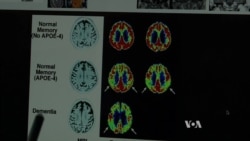Alzheimer’s is a frightening disease not only for those who suffer from the progressive memory loss, but also their loved ones.
But researchers at the University of California Los Angeles said a new way of treating Alzheimer’s is showing promise for reversing some of that memory loss. The treatment combines western medicine with eastern philosophy.
Dr. Dale Bredesen, with UCLA's Easton Center for Alzheimer’s Disease Research, said nine of 10 patients suffering from either Alzheimer’s or other cognitive impairments saw improvements in their memory. He said the new therapy treats the patients holistically, unlike traditional treatments for Alzheimer’s disease.
“They have either taken a single drug, monotherapy, to try with Alzheimer’s and that has been a failure repeatedly, or they have tried without any sort of background simply saying, 'Okay, try exercise, try changing your diet,' these sorts of things, and there has not been any way to understand how these things contribute to the disease,” Bredesen said.
A 55-year-old attorney who does not want her identity revealed because she suffered from progressive memory loss associated with early Alzheimer’s and still works is one of 10 patients who received a new therapy to treat memory loss.
"I could not remember conversations that I'd had with my kids and my husband. I started having to refer to my calendar all the time,” she said.
“I now have much more confidence in my work and am not afraid that I will forget something. I don't have to rely on my lists. I don't have to write everything down.”
Bredesen said there is a constant balance of the brain remembering and forgetting. He said many factors, including lifestyle, can create an imbalance in brain activity, leading to memory loss.
“We identified 36 different parts of this network that contribute to the imbalance. So when you are chronically on the wrong side of that balance, you are in fact pulling apart the connections instead of making them. Then, in the long run, that can lead to Alzheimer’s disease.”
The different elements include a person's diet, exercise and sleep habits. Through brain imaging, blood work and lifestyle questions, Bredesen creates an individualized therapy for each patient.
Treatments include lifestyle changes and even medications or supplements. He described this new therapy as combining western understanding of the human body with the eastern approach of looking at the whole patient.
“What we’re using is a combination that brings these two together to create a new kind of physician that is doing a different kind of medicine who understands the basis of molecular genetics, but also understands the need to bring things together in a network fashion,” Bredesen said.
He said for the nine patients experiencing improvement, it typically came within three to six months. He said the 10th patient was too far along in the disease to see results.
The UCLA center is now working with 30 additional patients as it moves to expand its research.





